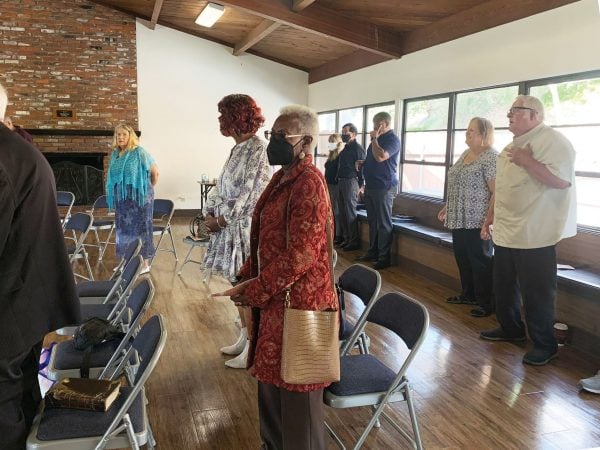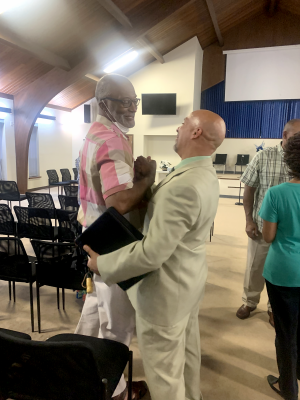
Not-so-simple stewardship
Dissolving a church or merging congregations can be complicated, not…
| Refresh | This website christianchronicle.org/listen-with-your-mouth-shut/ is currently offline. Cloudflare's Always Online™ shows a snapshot of this web page from the Internet Archive's Wayback Machine. To check for the live version, click Refresh. |
GREENSBORO, N.C. — I haven’t been to many elders’ meetings, but I have watched the turmoil, stress and pain of good friends who are elders as they lead a church through difficult times. I’ve watched them grieve and watched churches grieve.
And in the course of talking with folks around the country for the “Where have all the churches gone?” series, I’ve met a lot of grieving Christians.
Beyond the ever-present sorrows of lost loved ones, lost jobs and family struggles, churches are grieving new losses brought by a pandemic and by seismic cultural and demographic shifts that have polarized family and fellowship.
That’s why I was in Greensboro with my good friend and former minister Eddie Sharp, who has served a University Church of Christ in three cities — in Albuquerque, Abilene and Austin. No one is better at serving people in grief.
David Kneip, associate director of the Siburt Institute for Church Ministry at Abilene Christian University, asked us to talk with about 100 elders and other leaders gathered for Elderlink Greensboro about how they can help grieving churches.
Related: Not-so-simple stewardship
Churches I’ve visited or talked with over the past nine months were a varied collection. Some were always small. Some once had more than 1,000 members. White. Black. Diverse. Urban. Suburban. Rural. Some have closed. Some have merged. Some reinvented themselves. Some are still in limbo.
All of them were grieving.
Just as the grief of each family member differs after a loved one dies, the grief of each church member is different when a church dies — or when it changes in a way that makes it no longer recognizable.
While the congregations I’ve visited have varied in worship style, demographics and their niche on the conservative-progressive continuum, they all have grieved four common losses:
• Loss of place. We are famous for saying the church is not a building and that buildings don’t matter. But they do. Just like our homes matter.

Members of the Ragsdale Church of Christ in Manchester, Tenn., stand outside the church building before their final Sunday service.
Saying goodbye to a homeplace where family events took place — weddings, baptisms, funerals — is personal for people. The building, whether humble or extravagant, is not just where the congregation gathered. It’s also where families mourned and celebrated.
Sixteen years ago I sold a house that I absolutely loved, the house where my children grew up — a house that as a single parent I could no longer afford. My real estate agent, a good friend, told me, “You have to go say goodbye to the house.”
So before I handed off the keys, my 13-year-old daughter and I sat on the floor in the empty living room and said goodbye to our place. We laughed and cried and remembered our life there. It was cathartic.
When buildings are sold or torn down, people need a chance to say goodbye, too. It helps them grieve.
• Loss of history. Who will remember we were here? Who will know that we mattered in the kingdom? The greatest fear of the families I’ve known who have lost a child is that no one will remember. Losing a church is painfully similar.
I’ve heard stories of families who wouldn’t surrender the artifacts that document a congregation’s past –– people it helped, missionaries supported, preachers who ministered there. No one family or person should own that history.

The sign of the former Peabody Street Church of Christ in Edna, Texas.
Preserving the physical history of a congregation requires space, trained staff and a willingness to accept and protect the documents. Christian university archives provide a good place for such preservation, and several have staff in special collections and archives: Abilene Christian, Lipscomb, Harding, Oklahoma Christian, Pepperdine and Florida College.
Knowing that a beloved church’s history is preserved and accessible to generations yet unborn can help assuage the grief of losing one’s history.
• Loss of tradition. Kind of like we like saying, “The church is not the building,” we also famously say we reject tradition. We don’t. We need, value and love our traditions. And so long as we don’t confuse tradition with Gospel, tradition can be a good thing.
Worship traditions, social traditions, holiday traditions, family traditions pervade our church life. They bind us together and provide comfort and familiarity in times of stress and grief. When those traditions are lost as a church concludes its life cycle, our grief is multiplied by losing the traditions that gave us solace.
Related: A final song, a familiar end
• Loss of identity. I will never forget the woman who told me, “It’s always been Skillman Church of Christ, and it always should be.” Nor the man who explained that a building would be torn down rather than sold to a group that might not preserve its identity.
“My daddy would have wanted it this way,” he said.

Christians worship in the Skillman Church of Christ chapel.
How we understand our church is part of how we understand who we are. When it’s ripped away or just quietly expires, part of our own identity dies with it.
Sharp told church leaders that the pressure of a pandemic, siloing of politics and challenges of doctrinal transitions are traumatic for a church and a challenge for church leaders.
“During the pandemic, some elders came together to minister,” he said. “Some had churches with elders who disappeared.”

Cheryl Mann Bacon and Eddie Sharp speaks with Elderlink attendees.
But when stress and loss are great, he said, so is the need to minister in the name of Jesus. He offered seven guidelines for elders and other leaders:
• First, stand with them without words of explanation. “Go and be Jesus’ flesh and blood. And go with your mouth shut.”
Sharp related the story of Mitch East, minister for the University Avenue Church of Christ in Austin, and his lawn chair. When the pandemic was raging and isolation taking a toll on members, East told them he had a lawn chair in his car:
“You call me. I’ll come sit in your front yard and listen.”
• Let people tell their stories. What do they mourn? “Ask questions that let them tell stories of what they love and what they lost.”
Sharp urged leaders to avoid lapsing into telling their own tales. Rather, “Let people stay inside their story. Tell me about … what the pandemic has been like for you. What does church feel like for you now?”
• Ask them, what are they afraid of? “What about the future? What about practice? What about doctrine? We used to be able to count on the sameness of this church that had no organized structure.”
Citing Claire Bidwell Smith’s book “Anxiety: The missing stage of grief,” Sharp said beyond the Kubler-Ross stages of grief — denial, anger, bargaining, depression, acceptance — anxiety also must be recognized in the grieving process.

Members of the La Mesa Church of Christ in San Diego County worship on a Sunday morning.
• Look for the signs of anger. Anger may appear as division, labeling, financial blackmail or membership transfer. Those who insist on their own way or else are angry, and anger is grief.
• Figure out what they are denying. Be sensitive to those who act as if nothing has happened. Something happened.
A lot has happened.
• What are churches doing to keep them from doing what really needs to be done? “Sometimes doing good may need to wait for needed healing.”
Sharp advised his audience to question new plans or sudden changes. “Sometimes in times of stress people feel they just need to do something,” he warned, “which creates a PTSD-inducing environment.”

Greg Jasper fellowships with a member of the recently merged Church of Christ at Kennedy Heights.
Instead, leaders should remind folks to hang on to each other, minister to each other and just get through it.
“Now is not the time to raise the most turbulent issues,” he said. “Let’s get through the Red Sea and then go to Sinai. Get through this, and this will be our finest hour.”
• Finally, be willing to minister into the long process of healing. We will not recover quickly from the most serious health and societal upheaval of our time.
Whether the pandemic is over or not, even if it is, churches and church members have much healing to do, and leaders must commit to the long haul. The new normal has not yet arrived.
Don McLaughlin, preaching minister for the North Atlanta Church of Christ in Georgia and keynote speaker for the event, reminded those in attendance that despite the trauma of recent years, ministry is still important and on target.
“The truth is we’ve had a tough few years, but we are still Christians,” McLaughlin said. “We’re still on mission. We follow a Savior who went through Gethsemane on the way to the cross and prayed until he could get up and go do it.”
CHERYL MANN BACON is a Christian Chronicle correspondent who served for 20 years as chair of the Department of Journalism and Mass Communication at Abilene Christian University. Contact [email protected].
Subscribe today to receive more inspiring articles like this one delivered straight to your inbox twice a month.
Your donation helps us not only keep our quality of journalism high, but helps us continue to reach more people in the Churches of Christ community.